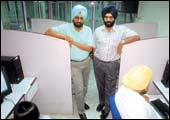 |
| BPO's next hot-spot: The IRM Information
Technology's call centre at Jalandhar has virtually no attrition |
| THE TIER II PROS AND CONS |
|
UPSIDE
»
Lower operating costs
» Abundance
of workforce
» Low
rates of attrition
|
DOWNSIDE
»
Poor telecom infrastructure
» Ralatively
poor workforce talent
» Potential
client discomfort with location |
At
first glance, Supportscape's building in the heart of the pink city
does not seem like a call centre. There is no chain of Qualis' lining
the entrance screaming 'call-centre here.' The building itself is
a humble three-storey stack of brick and mortar, without attitude,
as are the 150-odd people working here, in an ambience which is
typical of a non-metro-easy and relaxed. A bunch of youngsters on
the first floor of the building is providing e-mail based support
services to a large ISP in Europe, while the phone lines are busy
in the basement where a team of 30-odd people is working on debt
collection on behalf of New-York based Tritium Card Services. The
client, I am told, is more than happy with the collections, which
are being managed at an operational cost that is at least a third
lower than that of BPO cities like Gurgaon, Bangalore and Noida.
"We knew we were betting on the right city. Now, with GE here,
our stand is vindicated," says a beaming Manuj Goyal, the co-founder
and managing director of Supportscape.
A gemologist by training and vocation, Goyal
may have been led to Jaipur by affinity for his birthplace, but
that cannot be said for GE Capital International Services or GECIS
(pronounced jekis), the arm which provides outsourcing services
for GE. GECOS zeroed in on the city earlier this year after going
through a shortlist of 20 cities across the country. The first reason
that the company cites for choosing Jaipur is manpower (Rajasthan
produces over 50,000 graduates annually), the most crucial resource
for any outsourcing job, and accounting for the largest opex. Additionally,
the city is easily accessible from Delhi (about 270 kilometres),
has good infrastructure and a supportive government-all of which
contribute to providing a cost advantage.
The 200-strong team in Jaipur makes up just
about 2 per cent of the gecis workforce, which is concentrated in
Gurgaon (6,000 people) and Hyderabad (4,000 people), though there
are about 800 people in Bangalore too. "We plan to ramp up
our workforce in Jaipur to 1,500 in the next two-to-three years,"
says Ashok Tyagi, Business Leader at GECIS. "We are looking
at Cochin and Kolkata as additional cities, but are also considering
locations outside India."
 |
"We knew we were betting on the
right city. Now, with GE here, our stand is vindicated."
Manuj Goyal, Co-founder & MD,
Supportscape India, Jaipur |
Although the lower operating costs in these
cities is alluring enough, there is a neat bundle to be saved in
the capex too. Says the Executive Director of telemarketing firm
Manipal Informatics, Gautam Pai: "If we were to replicate our
Manipal facilities in Bangalore, the cost would be twice as much
if not more." With housing facilities on offer for its agents,
the company has willy-nilly created the country's first call-centre
campus.
Hot Jobs
The call centre training agencies are also
making a beeline for these Tier II cities where the next crop of
BPO agents, less demanding and more flexible, are coming up. Courtesy
the trainers, companies like the Jalandhar-based IRM Information
Technology, which runs an outbound call centre marketing credit
cards to US, do not need to invest in the basic training of agents,
who are more than willing to spend their own time and money to be
eligible for what is considered an elite and well-paying job. With
limited white-collared job options (read air-conditioned offices
without field work) in these cities, it is the crème-de-la
crème of the graduates that choose call centre as a profession.
"The agents that we get here are better than those we get in
Delhi. And there is no attrition since we are the only call-centre
here," says IRM's managing director Rajendra Garg. Its clients,
which include AT&T, Mastercard, Time Resorts and Cingular Wireless,
are location neutral, as long as you can deliver, he adds.
 |
Rakhra Tech's 50-seat centre provides
a whole gamut of back-office processing
Harinder Pal Singh (L) and Rajvinder
Singh, Managers (Operation), Rakhra
Technologies, Patiala |
Many of these one-city BPO companies are in
the process of expanding into four-digit strong teams and are struggling
to deal with the avalanche of resumes coming down on them, as also
the "requests" to accommodate the sons, daughters, nephews,
and nieces of the powers that be. The starting salaries-Rs 5,000
to 7,000-which are lapped up here would be scoffed at in the larger
cities.
Even in the US, there have been instances of
call centres moving to locations that are less expensive to set
up and maintain and where the quality of life of the agents is better.
In outbound calling, the one sure-shot formula for survival is cost-cutting,
which, on the scale that it is required, can only be served up by
virgin cities. While a US regulation prohibiting telemarketing calls
to those who have signed up for the "do not call" list
is expected to hit this business, there are grey areas in the regulation
that the telemarketers hope will see them through. No one is pushing
the panic button just yet, besides which demand is still coming
in from Europe and Australia.
There is, however, a dark lining to what is
largely a silver cloud. The one crucial resource which these Tier
II cities offer-low cost, non-attrition prone, English speaking
manpower-is partly vitiated by the lack of another crucial resource-telecom
infrastructure. Jalandhar's IRM, for example, which employed over
100 agents working in two shifts some months ago, has had to cut
back due to technical problems with telecom links, which are also
more expensive in the distant cities. "We have recently shifted
to internet telephony and feel that it will be a viable unit soon,"
says Garg.
 |
| Manipal Informatics: The company
set up this call centre in Manipal at half the price it cost
in Bangalore |
At Patiala, where Rakhra Technologies is running
a 50-seat centre providing the whole gamut of back-office processing
to the promoter's chain of gas stations and convenience stores in
US under Bulk Petroleum Corporation, the telecom infrastructure
costs twice as much as neighbouring Chandigarh. Nevertheless, the
company is investing in real estate to set up a 1,000-seat centre
since the professed objective of the exercise is to provide employment
to the educated elite of the city. "Whether anyone believes
me or not, generating employment was my primary reason for choosing
Patiala. I can't deny though that outsourcing does cut my costs,"
says the US-based promoter and founder Darshan Dhaliwal.
These problems notwithstanding, the smaller
cities are set to capture a larger slice of the $1 billion (Rs 4,600
crore) BPO pie. With clients becoming increasingly location-neutral
and captive outsourcing units growing in popularity, expect to see
more and more non-conventional cities coming into the fold of those
who roll their R's and twist their T's.
additional reporting by Venkatesha
Babu
|

